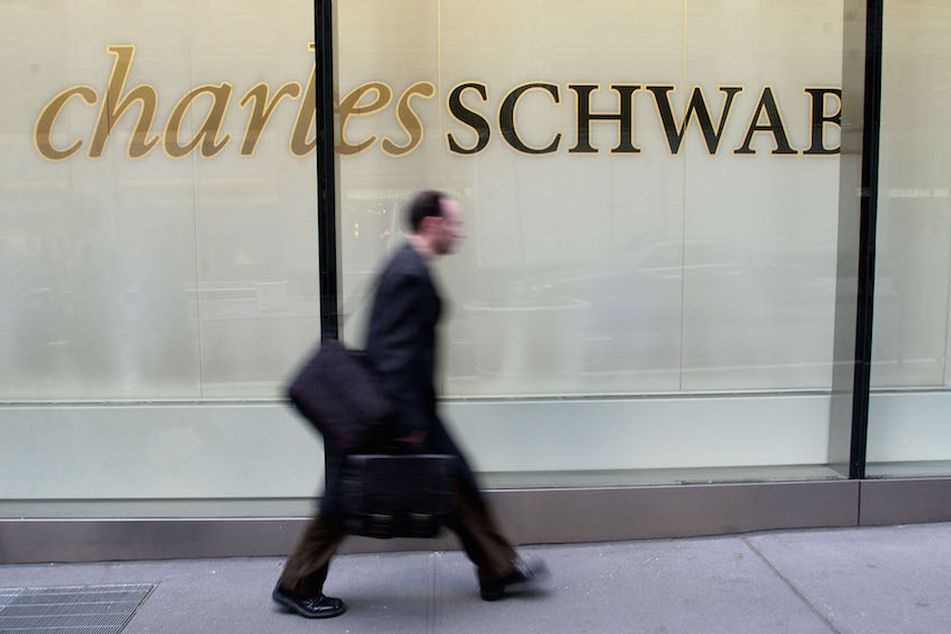Charles Schwab lawsuit win has big implications for all 401(k) plans
 The Charles Schwab logo hangs in the window of an investment center in New York on Nobember 14, 2003. Charles Schwab Corp., pioneer of the mutual fund supermarket, found evidence of possible illegal customer trading in some of the 3,000 funds it sells, and was
subpoenaed by New York State Attorney General Eliot Spitzer. Photographer: Daniel Acker/Bloomberg News.
The Charles Schwab logo hangs in the window of an investment center in New York on Nobember 14, 2003. Charles Schwab Corp., pioneer of the mutual fund supermarket, found evidence of possible illegal customer trading in some of the 3,000 funds it sells, and was
subpoenaed by New York State Attorney General Eliot Spitzer. Photographer: Daniel Acker/Bloomberg News.
The ruling could mean plan sponsors can force employees into individual arbitration rather than defend a class-action suit.
Charles Schwab Corp. has won its appeal of a 401(k) lawsuit that could have broad implications for all 401(k) sponsors by reducing the number of employee class action lawsuits.
The firm was challenging a 2018 ruling in California district court that said Schwab could not arbitrate the claims of plaintiff Michael F. Dorman, a former employee, despite the 401(k) plan having an arbitration agreement in place.
A three-judge panel for the U.S. Court of Appeals for the Ninth Circuit reversed the decision on Wednesday and sent the case back to the lower court, saying the district court had “erred” by not enforcing the plan’s arbitration agreement.
James A. Bloom, an attorney for the plaintiff, said the team is reviewing the decision and evaluating its options.
The ruling carries significance for all 401(k) plan sponsors, since it appears employers can prevent class-action litigation by adding arbitration agreements to their 401(k) plans — which hadn’t previously been the prevailing legal view.
“If, in fact, the Ninth Circuit’s view takes hold in other circuits, then this would indeed mark a key turning point regarding the arbitration debate,” said Andrew Oringer, partner and co-chair of the employee benefits and executive compensation group at law firm Dechert. “Up until now the case law had been to the contrary.”
[Recommended video: Retirement advisers can boost business by focusing on participants in these ways]
Mr. Dorman sued the firm in 2017. He alleged Schwab breached its fiduciary duties under the Employee Retirement Income Security Act of 1974 by adding poorly performing in-house investment funds to its 401(k) plan, enriching itself at the expense of its employees’ retirement savings.
Schwab had added an arbitration provision to its retirement plan that took effect in 2015, during Mr. Dorman’s tenure. The clause says that any claim, dispute or breach related to the 401(k) plan had to be settled by binding arbitration, waiving participants’ rights to enter a class or collective action. The clause says arbitration would be conducted on an individual basis only.
The district court denied Schwab’s motion to compel individual arbitration.
Institutions typically prefer to resolve disputes in an arbitration setting because they’re often quicker, less costly to litigate and, perhaps most importantly, allows them to avoid the large multimillion-dollar settlements and damages that have been common in class-action 401(k) litigation. Such lawsuits against 401(k) plan sponsors and financial-services firms have proliferated over the past decade and a half.
The Ninth Circuit had previously, in a case more than 35 years ago — Amaro v. Continental Can Co. — said ERISA cases are not arbitrable. Arbitrators, the court said at the time, “many of whom are not lawyers, lack the competence of courts to interpret and apply statutes as Congress intended.”
Judge Benita Y. Pearson, writing the opinion of the circuit panel in the Schwab ruling, said that position “is no longer good law in light of intervening Supreme Court case law,” including the 2013 case American Express Co. v. Italian Colors Restaurant.
In the American Express case, the Suprement Court held that there is “nothing unfair about arbitration — even arbitration on an individual basis — as long as individuals can vindicate their statutory rights in the arbitral forum,” according to Ms. Pearson’s ruling.
“Amaro, therefore, is no longer binding precedent,” Ms. Pearson said.
“The big impact of the decision, I think, is that properly drafted plan provisions can prevent class actions against the plan,” said attorney Charles G. Humphrey, former counsel at the Department of Labor. “That’s a big win for plan sponsors.”
While the ruling only applies to the Ninth Circuit at this point, attorneys say it’s attention-grabbing since the circuit includes California.
“It is a circuit court, which is in itself a significant thing,” said Mr. Oringer of Dechert. “And it’s the Ninth Circuit, which is by comparison one of the circuits that is commonly looked to for leadership regarding judicial thinking.”
Some attorneys disagree that the ruling would greatly impact the ultimate outcome for plaintiffs.
Jerome Schlichter, the plaintiff’s attorney who pioneered excessive-fee litigation against 401(k) plan sponsors, said ERISA gives a participant the right to bring an action on behalf of the entire 401(k) plan. Even if the Ninth Circuit decision were to become final, he believes an arbitrator would be able to award damages to the entire 401(k) plan, even if the arbitration only involved an individual.
“The arbitrator would have to follow the law,” Mr. Schlichter said.
Learn more about reprints and licensing for this article.








